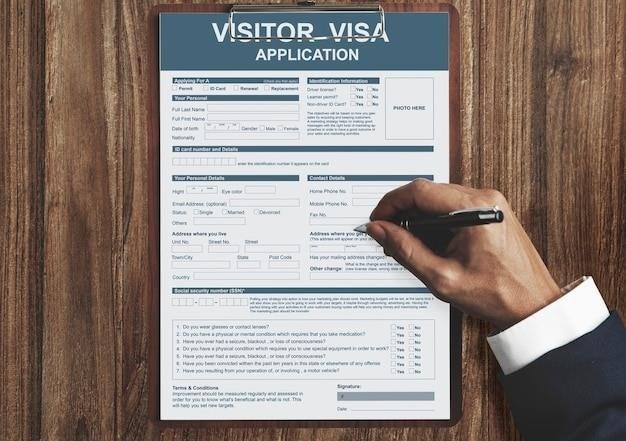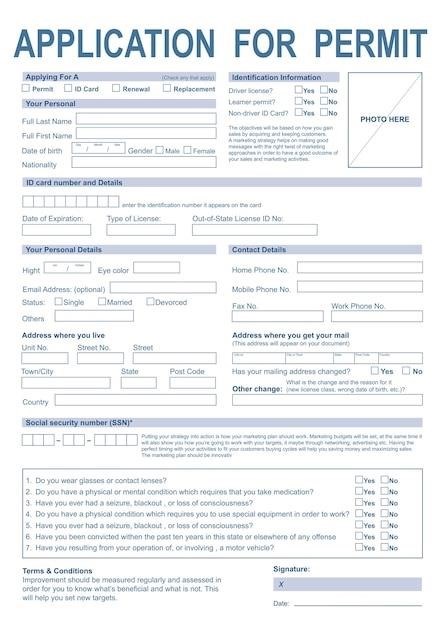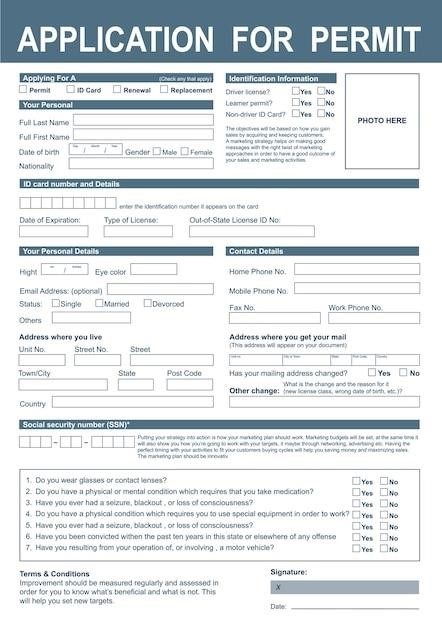
Ghana Visa Application Form PDF⁚ A Comprehensive Guide
This guide provides comprehensive information on obtaining a Ghanaian visa․ It covers locating application forms, online portals, embassy websites, and third-party services․ Details on filling out the form, required documents, processing times, and fees are also included․
Where to Find the Application Form
Securing the Ghana visa application form can be achieved through several avenues․ The official website of the Ghanaian embassy or consulate in your region is the primary source․ These websites often provide downloadable PDF versions of the application form, ensuring you have the most up-to-date version․ Alternatively, third-party visa services may offer access to the forms, though using official channels is generally recommended to avoid scams․ Remember to carefully review the form’s instructions and ensure it’s the correct version for your specific visa type before completing it․ Some online resources may also offer fillable PDF templates for convenience․ Always verify the legitimacy of any website or service before providing personal information․ In some cases, you may need to contact the embassy directly to request the form via mail or email․
Online Application Portals
Many countries, including Ghana, are increasingly utilizing online portals for visa applications․ These platforms offer a streamlined and efficient method to submit your application materials․ Before starting, ensure you have all necessary documents scanned in a suitable format (usually PDF)․ The online portal will guide you through each step, requiring you to input personal information, select your visa type, upload supporting documentation, and make the necessary payments․ The convenience of online portals is undeniable; however, it’s vital to check the official Ghanaian embassy website for the authentic portal link to avoid fraudulent websites․ These portals often include features like application tracking, allowing you to monitor the progress of your application․ Be sure to print a confirmation page once your application is successfully submitted for your records; Remember to carefully review all information before submitting, as corrections may be difficult or impossible after submission․
Embassy and Consulate Websites
The official websites of Ghanaian embassies and consulates are primary resources for visa application information․ These sites typically provide detailed instructions, downloadable application forms (often in PDF format), and information on required documents․ Navigating these websites requires careful attention to detail; look for sections dedicated to “Visas,” “Consular Services,” or “Passport and Visa․” The websites may also list contact information for inquiries regarding specific visa types or application statuses․ Remember that information may vary depending on your country of residence; always refer to the website of the Ghanaian embassy or consulate in your specific region․ These official sources are crucial for avoiding misinformation and ensuring you have the most up-to-date procedures․ Before visiting an embassy or consulate in person, review the website thoroughly to understand the process and necessary preparations․ Checking the website regularly for announcements or updates concerning visa processing times or application requirements is highly recommended․
Third-Party Visa Services
While applying directly through Ghanaian embassies or consulates is recommended, several third-party visa services exist․ These services often assist with application preparation, document collection, and submission․ However, exercise caution when using such services․ Thoroughly research any third-party provider before engaging their services․ Verify their legitimacy and check online reviews to assess their reliability and customer satisfaction․ Be aware that these services typically charge fees in addition to the official government visa fees․ Understand exactly what services are included in their fee structure․ Never provide sensitive personal information or financial details unless you are confident in the security measures of the third-party provider․ Always independently verify the information provided by third-party services with official Ghanaian government sources to ensure accuracy․ Using a third-party service doesn’t guarantee faster processing; it merely streamlines the application process for those who prefer assistance․ Ultimately, you remain responsible for ensuring your application is complete and accurate․
Filling Out the Application Form
Carefully read all instructions on the Ghana visa application form before beginning․ Ensure you have all necessary documents readily available, such as your passport, passport photos, and supporting documentation relevant to your visa type․ Complete each section accurately and legibly, using capital letters where specified․ Double-check all information for accuracy, paying close attention to spelling and dates․ Incomplete or inaccurate forms can lead to delays or rejection․ If a question is not applicable to your situation, indicate this clearly, following any instructions provided on the form (e․g․, marking “N/A” or leaving the section blank as instructed)․ Maintain a professional tone throughout the application․ Avoid making any unnecessary comments or adding irrelevant information․ Before submitting your application, review the entire form thoroughly for completeness and accuracy one last time․ Making mistakes can cause significant delays in processing your application․ If you are unsure about any aspect of the application process, seek clarification from the relevant Ghanaian embassy or consulate before submitting your application․
Required Information and Documents
The Ghana visa application process necessitates providing accurate personal details․ This includes your full name as it appears on your passport, date of birth, nationality, and passport number․ You will also need to provide your current address, contact information, and details about your intended trip to Ghana, including purpose of visit (tourism, business, etc․), dates of travel, and intended length of stay․ Crucially, you’ll need to furnish a recent passport-sized photograph meeting specific specifications as outlined by the Ghanaian embassy or consulate․ Supporting documentation varies depending on your visa type․ For tourism visas, proof of onward travel arrangements (flight or other transportation bookings) and sufficient funds to cover your stay are usually required․ Business visas may necessitate a letter of invitation from a Ghanaian company or organization, while student visas require acceptance letters from educational institutions․ Always check the specific requirements for your visa category on the official Ghanaian embassy website․ Failure to provide all necessary documentation may lead to delays or rejection of your application․
Passport Photos and Specifications
A crucial aspect of your Ghana visa application is providing a compliant passport photograph․ The Ghanaian embassy or consulate will specify the exact requirements, so carefully review their guidelines before submitting your application․ Generally, expect to need a recent, high-quality photograph taken within the last six months․ The photo should be in color, with a plain, light-colored background․ Your face should be clearly visible, occupying a significant portion of the image, with a neutral expression and direct eye contact with the camera․ Hats, sunglasses, or head coverings are typically not permitted unless worn for religious reasons․ The photograph should be well-lit, with no shadows obscuring your facial features․ Digital photos are usually acceptable, but ensure they meet the specified resolution and file size requirements․ Poor-quality photographs can lead to application delays or rejection․ It is best to use a professional photographer familiar with passport photo requirements to guarantee compliance and avoid unnecessary complications․ Consider multiple copies to ensure you have a spare in case one is damaged or lost․

Supporting Documents for Different Visa Types
The specific supporting documents needed for your Ghana visa application vary significantly depending on the type of visa you are applying for․ Tourist visas, for example, typically require proof of onward travel arrangements, such as flight or bus tickets, and sufficient funds to cover your stay․ Business visas often necessitate a letter of invitation from a Ghanaian company or organization detailing the purpose of your visit, along with evidence of your business affiliation; Student visas demand proof of acceptance from a Ghanaian educational institution and evidence of financial support for tuition and living expenses․ Work visas require a job offer from a Ghanaian employer and potentially a work permit․ Each visa type has its own unique set of requirements, so carefully check the official guidelines for your specific visa category․ Failure to provide all necessary documentation can result in delays or rejection of your application․ Always keep copies of all submitted documents for your records and ensure that all provided information is accurate and truthful․ Preparing these documents well in advance can streamline the application process․
Processing Times and Fees
The processing time for a Ghanaian visa application can vary considerably depending on several factors, including the type of visa applied for, the completeness of the application, and the workload of the processing center․ While some applications may be processed relatively quickly, others might take several weeks or even months․ It’s crucial to apply well in advance of your intended travel dates to allow ample time for processing․ The specific fees associated with a Ghana visa application also vary according to visa type and the applicant’s nationality․ These fees are generally non-refundable, regardless of the application’s outcome․ It’s essential to check the official website of the Ghanaian embassy or consulate in your region for the most up-to-date information on processing times and fees․ Payment methods may also vary and could include options such as bank transfers, money orders, or credit card payments․ Always confirm the accepted payment methods before submitting your application to avoid delays․ Accurate and timely payment is crucial for the timely processing of your application․
Visa Application Fees and Payment Methods
The cost of a Ghanaian visa varies depending on the type of visa and the applicant’s nationality․ It’s crucial to check the official website of the relevant Ghanaian embassy or consulate for the most current fee schedule․ Fees are generally non-refundable, regardless of the visa application’s outcome․ Applicants should be prepared to pay the exact amount required, as insufficient payment may lead to delays or rejection․ Several payment methods are typically accepted, although this can differ between embassies and consulates․ Common options include bank transfers, money orders, and credit card payments․ However, some missions may only accept specific payment methods, such as those issued by local banks․ Always confirm the accepted payment methods and any specific instructions before submitting your application․ Ensure you retain proof of payment as this will be required during the application process․ Failure to provide this documentation could result in significant processing delays․ Accurate and complete payment information is critical for successful and timely visa processing․
Tracking Your Application Status
Once you’ve submitted your Ghanaian visa application, monitoring its progress is essential․ Many Ghanaian embassies and consulates offer online tracking systems․ These systems typically require your application reference number, which is provided after submission․ Using this number, you can usually access the current status of your application, including whether it’s pending, approved, or rejected․ However, the availability and functionality of these online tracking systems can vary depending on the specific mission․ If an online tracking system is unavailable or unreliable, consider contacting the embassy or consulate directly via phone or email․ When contacting them, have your application reference number ready to expedite the process․ Be aware that response times may vary due to workload and other factors․ Regularly checking the status of your application, using both online tools and direct communication if necessary, will keep you informed and help ensure a smooth process․ Proactive monitoring minimizes uncertainty and allows for timely action if any issues arise․
Online Application Tracking Systems
Many Ghanaian embassies and consulates now provide online systems for tracking visa application status․ These systems offer a convenient way to monitor your application’s progress without needing to contact the embassy directly․ Typically, you’ll need your application reference number (provided after submission) to access the tracking portal․ The portal usually displays the current stage of processing, such as “received,” “in review,” “approved,” or “rejected․” However, the specific features and availability of these online tracking systems can vary significantly․ Some systems may provide detailed updates, while others may offer only basic status information․ It’s advisable to check the specific embassy or consulate’s website for instructions and access details to their tracking system․ If the embassy or consulate doesn’t explicitly mention an online tracking system, it’s best to contact them directly to inquire about the status of your application․ Remember that even with online tracking, occasional delays in updating the system are possible․
Delivery of Processed Documents
Once your Ghanaian visa application is processed, the method of document delivery depends on the specific embassy or consulate and your chosen application method․ Some embassies may offer the option of in-person collection, requiring you to visit the embassy to retrieve your passport and visa․ Others might utilize postal services, sending your documents by mail to your provided address․ This usually involves registered or courier mail to ensure secure and trackable delivery․ It’s crucial to provide a complete and accurate mailing address to prevent delays or misdelivery․ For applicants using third-party visa services, the delivery method is typically coordinated through the service provider․ They often handle the collection of the passport and visa from the embassy and subsequent delivery to the applicant․ Inquire about delivery options and associated costs during the application process․ Note that delivery times can vary, depending on the embassy’s processing speed and postal service efficiency․ Always confirm your delivery method with the appropriate authority before submitting your application․
